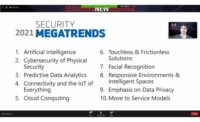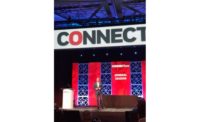At the Securing New Ground conference, held October 29-30 in New York City, industry executives, manufacturers, integrators and financial partners gathered to discuss the business of security. Founded in 1996 by Sandra Jones of Sandra Jones and Company, this year marked the 23rd year of this banner event — and the last for its founder, who announced her retirement at the event. Always a high-level discussion of the most relevant topics of the day, this year’s event did not disappoint. From the opening welcome, the direction was clear.
“The industry is very strong and stable,” said Scott Schafer, chairman, SIA board of directors. “New technologies are positively impacting security. Cyber security, cloud, privacy and AI are all part of our fabric now. They were not a part of SNG 10 years ago.” And while some of these developments present challenges, Shafer added, “A lot of the excitement we feel every day is because the technologies have really swung our way. Count yourselves lucky. You are in an industry that is going places.”
Every year, SIA, which hosts the SNG conference, presents a list of megatrends based on focus groups and surveys prior to SNG. This year’s megatrends were:
- Cybersecurity Impact on Physical Security
- AI
- Facial Recognition
- Emphasis on Data Privacy
- Cloud Computing
- National Security Concerns
- Connectivity and IoT Everything
- Workforce Development
- Move to Service Models
- Identity as the New Perimeter
While all of these trends came up multiple times at the event, the top five were particularly top-of-mind — especially data privacy.
“We typically talk all about the opportunity we have as an industry,” said Fredrik Nilsson, vice president, Americas, for Axis Communications and moderator of the first panel of the day: A View From the Top, From Relays to Cyber and AI: Ethics, Opportunities and Responsibility as an Industry. “We all know we have opportunities, but there are other topics we need to talk about. There are questions about our responsibility and the ethics that start to arise.”
Nilsson pointed out that the security industry has been front-page news in the past year, from proposed biometrics regulations to cyber security breaches. “All of a sudden what we thought of as a very nice and growing industry with good opportunity for all of us is a front-page discussion that our friends and neighbors are having.”
One of the panelists, Kim Loy, chief product officer for ACRE, noted her first-hand look at the privacy concerns in Europe and the lessons to be learned from that, even if the regulation doesn’t affect your company yet. “Having been in Europe when GDPR went into effect, there was a lot of work that went into that. … The impact across all industries from end users to integrators to manufacturers is probably our greatest challenge. Any of us companies should be looking at GDPR as a good guideline for how to take action now because it is good practice moving forward.”
Privacy came up again in a later panel on Translating Technology to Security and to Revenue.
Panelist Sal Mani, global director, technical security for Ripple, pointed out the implications of blending security and convenience. “In the past security was never convenient. You made things difficult for your bad actor. Now we are getting to the convenience of frictionless security. The benefit is that now that gives us more opportunity to see that the right behaviors are happening.”
But the challenge is privacy, added Kasia Hanson, global director, channel scale-video, cities and healthcare for Intel. “We all have mobile devices and it is great to have this convenience. But privacy and security are still not completely solid. … Privacy issues will continue as long as we are all on this earth, but the security industry has an opportunity to make it a lot more secure.”
The day two morning keynote speaker, Gary Shapiro, president and CEO of the Consumer Technology Association (producer of the Consumer Electronics Show) compared the privacy issue to the story of Goldilocks and the three bears. “One of the biggest issues I want to talk about is privacy because a lot has happened all at once. … We are seeing a huge turning point in where the world is going. It is not just about jobs or technology or economic leadership; it is about who we are and what we do and fundamental human rights.”
Shapiro cited Europe’s GDPR regulation as being very stringent on the side of privacy. On the other side of the equation, he said, is China. “What they are doing with technology is what is causing me angst. They are using it to socially rank everyone in the country. … That score determines whether you can fly on an airplane or even how you are ranked on a dating site.
“China basically says there is no privacy. Europe says it is all about privacy. The way I look at it up to this point in history is like Goldilocks [and her porridge]. China with their no rights is a little too cold. Europe with everything about privacy and nothing about innovation is too hot.”
The lesson for those in the room is to try to make the porridge just right. Shapiro cited recent efforts to regulate facial recognition as something to keep a close eye on. “That technology has a lot of good applications. Don’t throw the baby out with the bathwater. Recognize there are issues with all new technologies. There is always a group of people saying ‘This is bad; this is going to hurt us.’”
Automation was another topic on many presenters’ minds. Brian Tuskan, chief security officer of Microsoft Global Security called AI the fourth disruption in his presentation Defining the Future of Security.
“The first disruption was the PC; ten years later the internet connected things. Then in 2010 Apple created the iPhone and Google stepped it up and made Android. That was the third disruption. Now the fourth disruption is here and it is autonomy. Data has gone from scattered to organized; searches from human to app; and reality from separate to blended. You have robotics and cognitive learning in these smart machines.”
In a panel on Addressing the Future of Consumer and Small Business Security, Anne Ferguson, vice president, marketing for Alarm.com also noted how the home automation industry has shifted in recent years based on this trend. “Three or four years ago home automation meant turning on a light or controlling a washing machine. Now we have a great opportunity to move from individual products to experiences. Success will get to a point where we are walking into consumers’ homes or businesses and saying, ‘What experience are you trying to have?’ We are moving from devices to experiences.”
Lee Odess, vice president, service provider business for Allegion, and moderator of the panel, added, “There is an opportunity to create things versus having it forced upon us. I feel like it is a great time to be in the industry due to the adoption and expectations. We are moving from the connected space into the smart space and delivering on the promises of the Jetsons. That gets me excited.”
Cyber security and cloud were prominent topics in the panel Changing the Channel: the Business of Integration and Distribution.
“The industry is strong right now and while the music is playing we all have to dance,” said panelist James Rothstein, senior vice president, global security solutions for Anixter. “Cloud can make an integrator more efficient, profitable and stable.” He also noted the importance of getting onboard with cyber solutions and protocols.
Panelist Bill Bozeman, CEO of PSA Security Network, expressed both concern and praise for integrators when it comes to cyber security. “I worry our smaller and mid-sized integrators will get squeezed out when government and consultants finally regulate cyber security. I think that is absolutely going to happen and we need to get everybody ramped up before that.” However, he did give them a pat on the back. “We acquired a Pro-AV company. They normally do larger and more sophisticated projects and they are still in complete and total denial [about cyber concerns]. The security industry professionals are no longer in denial; they are just not sure what to do. On the food chain of low-voltage contractors, physical security is doing well.”
One of the most anticipated panels was also the last: Investment Insights for the Security Industry, moderated by John E. Mack III, executive vice president, Imperial Capital, who started off with the question on everyone’s mind.
“The market has held up. It is the 11th year of the bull market, the longest in the history of the country. The question is how long it will last? There is over a trillion dollars in private equity and it is generally very healthy at this point.”
While noting some softening, particularly in M&A and some nerves in an election year, panelist Alper Cetingok, managing director, head of diversified industrials for Raymond James was generally optimistic. “Overall the headline is that M&A is declining in volume, but that is not surprising. There has been unprecedented activity for a long period of time and it is harder to go up from where we were. Yes we are closer to a downturn and this year with some of the other geopolitical factors and an election year we are feeling more of that sentiment pervade in the marketplace. But valuations are still very high. Activity has continued in 2019 and I don’t see any real downturn. We feel like 2020 will actually be a stronger year than 2019.”
Whether rapid changes in technology, cyber concerns or financial challenges, uncertainty will always be a factor, but Anixter’s Rothstein left the integrators in the room with this advice during his panel: The more integrators can be focused on building the business successfully and carefully with their partners in the channel, the better off they will be. “The economy can change. The music can slow down and you have to find a way to dance and make sure your company is in a good position to do so.”
Anyone attending SNG this year left with plenty of insight on how to do just that.






